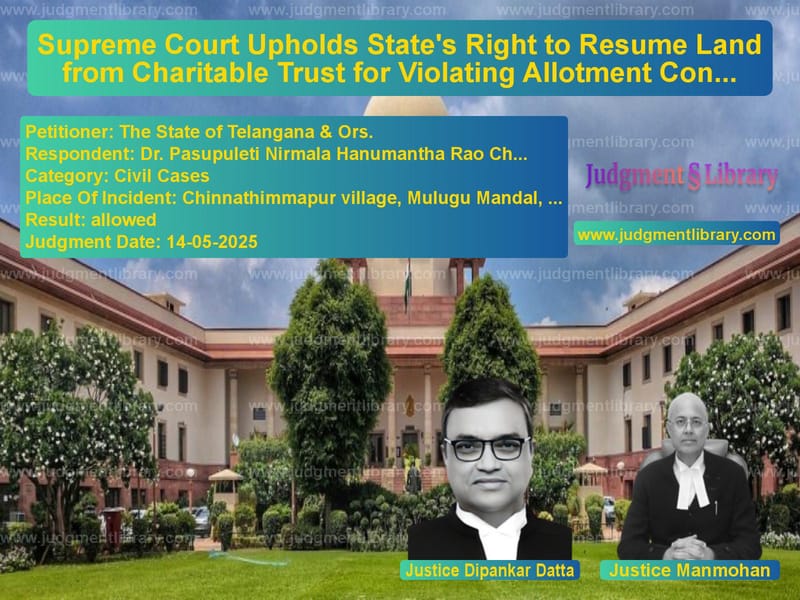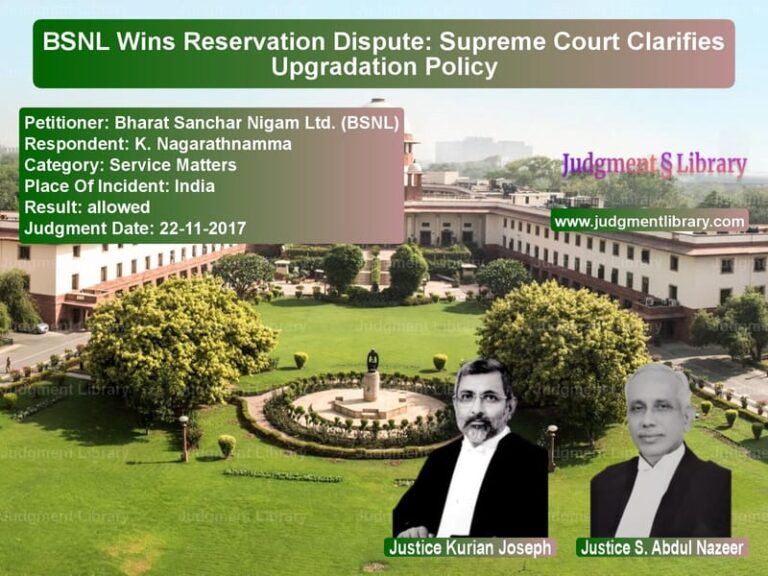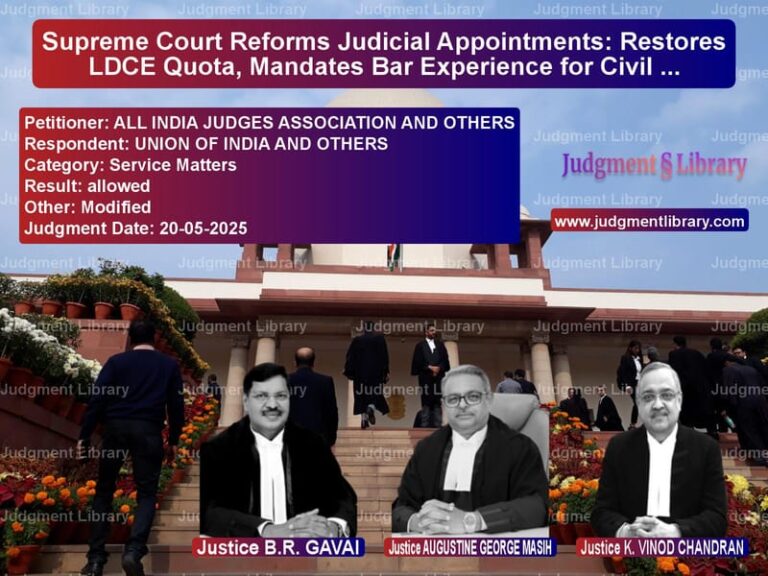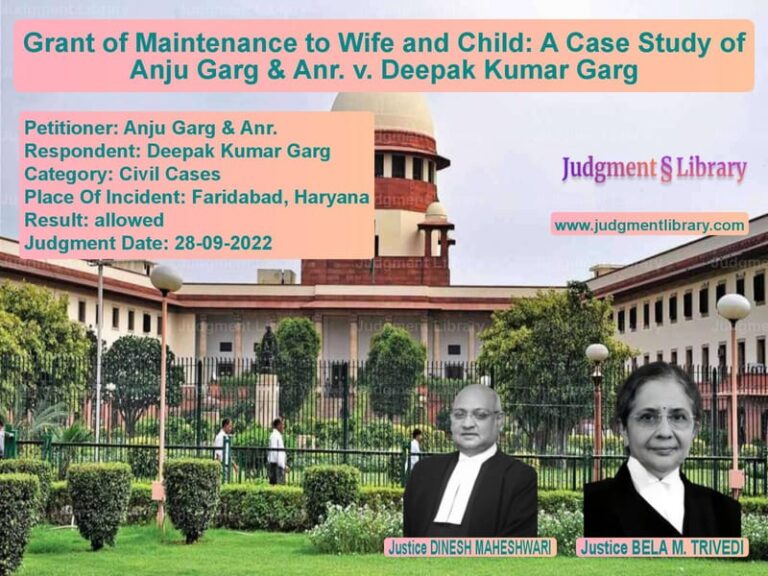Supreme Court Upholds State’s Right to Resume Land from Charitable Trust for Violating Allotment Conditions
In a significant judgment that clarifies the distinction between sale and allotment of government land, the Supreme Court has overturned the Telangana High Court’s decision and upheld the State Government’s right to resume land from a charitable trust that violated the conditions of allotment. The case involving Dr. Pasupuleti Nirmala Hanumantha Rao Charitable Trust has established important principles about the nature of government land allotments and the enforceability of conditions attached to such transfers for public purposes.
The legal dispute centered around 3.01 acres of land in Chinnathimmapur village, Medak District, which the State Government had allocated to the charitable trust in 2001. The trust, after obtaining the land, attempted to develop it as a residential colony named ‘Eden Orchard’ and even sold plots to third parties, leading the State Government to issue a resumption order in 2012. The trust challenged this resumption, arguing that since they had paid market value for the land, it constituted a sale rather than an allotment, and any conditions restricting its use were void under Section 10 of the Transfer of Property Act.
The State Government’s Arguments
Mr. S. Niranjan Reddy, learned senior counsel for the State of Telangana, presented a comprehensive argument emphasizing the statutory nature of the land allocation. He pointed out that “under Section 25 of Telangana Land Revenue Act, the Commissioner/Collector can assign/set apart any land for the purpose of public benefit.” He further elaborated that the allocation was governed by the Telangana Alienation of State Lands and Land Revenue Rules 1975, which specifically provided conditions for such grants.
Mr. Reddy drew the Court’s attention to Rule 6 of the 1975 Rules, which states that “Every grant of Alienation of State land whether for religious Educational or any other public purpose always be subject to the following conditions: The Government may resume the land wholly or in part with any buildings thereon, in the event of the infringement of any of the conditions of the grant.” This provision formed the legal basis for the State’s action.
The senior counsel emphasized that “the Appellant-State was not intending to sell the land but to allot the same to charitable trust for a charitable purpose for the benefit of public at large.” He highlighted the fraudulent conduct of the trust, pointing to a General Power of Attorney executed in 2011 where the trust “had fraudulently executed a GPA without making any reference to the allotment letter dated 08th February, 2001 or the conditions on which the allotment of said land had been made.”
Mr. Reddy revealed the trust’s actual intentions, stating that “the Power of Attorney holder had cut a colony by the name ‘Eden Orchard’ on the land allotted to the Respondent-Trust and even some of the plots had been sold to third parties without disclosing the conditions on which the initial allotment had been made.”
The Charitable Trust’s Defense
Mr. Gaurav Agrawal, learned senior counsel for the Respondent-Trust, presented a contrasting interpretation of the transaction. He contended that “the subject land was sold by the State Government after following the due procedure stipulated in G.O.Ms. No. 635 dated 02nd July, 1990, wherein the District Collector, Medak in consultation with the Commissioner of Land Revenue sold the land to the Respondent-Trust on payment of market value.” He emphasized that “the said sale was made at market value and the same was not an allotment at any concessional rate.”
The trust’s counsel argued that “the said alienation contained a general condition that ‘the land would be utilised only for the purpose for which it is allotted’ without actually specifying the exact purpose for the allotment.” He maintained that “any such condition on usage would be violative of Section 10 of the TPA.”
Section 10 of the Transfer of Property Act, which formed the cornerstone of the trust’s argument, states: “Where property is transferred subject to a condition or limitation absolutely restraining the transferee or any person claiming under him from parting with or disposing of his interest in the property, the condition or limitation is void.”
Mr. Agrawal also raised procedural concerns, submitting that “the resumption order dated 19th January 2012 was passed in violation of the principle of natural justice.” He suggested that if the Court was inclined to set aside the High Court’s orders, it should remand the matter for fresh adjudication on merits.
The Supreme Court’s Analysis
The Supreme Court bench comprising Justices Dipankar Datta and Manmohan undertook a detailed examination of the case, framing three crucial issues for determination: whether the transaction constituted a sale or allotment, whether conditions were imposed, and whether such conditions violated Section 10 of the Transfer of Property Act.
The Court first examined the nature of the transaction, concluding that “alienation of land by the District Collector, Medak, Government of Andhra Pradesh vide order dated 8th February, 2001 was not a sale, but an allotment under a statutory Scheme.” The Court based this finding on the specific language of the alienation order, which contained three clear conditions and explicitly stated that “in case of any deviation of the above conditions the land shall be resumed back by the Revenue authorities.”
The Court found compelling evidence that the trust was fully aware of the conditional nature of the allotment. It noted that in response to the State’s letter dated November 23, 2011, the trust had specifically replied that “there are no such violations in the conditions laid down in the District Collector Medal Proceedings No.E3/7542/98, Dt.8.2.2001. After taking the possession the above land is being utilized for the purpose alienated.” This admission proved crucial in establishing the trust’s knowledge of the conditions.
The Court strongly criticized the High Court’s approach, stating that “the High Court fell in error in making out a case of sale, ignoring the fact that the Appellant-State had allotted land to the Respondent-Trust under a statutory scheme of alienation/allotment.”
Legal Principles Established
The Supreme Court’s judgment establishes several important legal principles regarding government land allocations. The Court emphasized that “when the Government decides to sell its land… the Government can neither select a buyer nor can it fix a price unless and until the said decision is backed by a social or economic or welfare policy/purpose.” It referenced settled law that “the Government cannot distribute State’s largesse and normally the State ‘must’ get the ‘maximum value’ of the resources, especially when State-owned assets are passed over to private individuals/entities unless there are good and cogent reasons for doing so in special circumstances.”
On the crucial question of whether statutory allotment schemes are eclipsed by Section 10 of the Transfer of Property Act, the Court held that “Rules 1975 and the Board of Revenue Standing Orders operate in a completely distinct space and are not eclipsed by Section 10 of the TPA.” The Court reasoned that “the Appellant-State had allotted land to public trust for public purpose. In such a situation, the State cannot be put in the normal classical inter vivos party’s position as public interest is supreme and must prevail.”
The Court found evidence of malafides in the trust’s conduct, particularly in the General Power of Attorney executed in 2011. It noted that “the conditions on which the allotment had been made by the State Government were not mentioned/disclosed in the G.P.A. which reflects malafides of the Respondent-Trust (allottee).”
Fraud on the Statute
The Supreme Court used strong language to describe the trust’s actions in developing a residential colony on the allotted land. It declared that “the decision to cut a colony in violation of the specific conditions on which land had been allotted cannot be termed as anything else but fraud on the statute.”
The Court noted that “the Respondent-Trust, despite having accepted the conditions of grant of alienation laid down under Condition No.6 of the Andhra Pradesh Board Standing Orders, violated these conditions as the said land was not used for the purpose for which it was granted, i.e. for the purpose of a Charitable Trust.” Instead, “a colony was cut on the said land, which was sub-divided into plots, some of which have already been sold to third parties vide different sale deeds in violation of the conditions of allotment.”
Broader Implications
This judgment has significant implications for land allocation policies across India. It reinforces the principle that government land allotted for specific public purposes cannot be converted to commercial use by the allottees. The decision protects the State’s ability to ensure that land allocated for charitable, educational, or other public purposes continues to serve those objectives.
The judgment also clarifies the legal distinction between sale and allotment of government land. While a sale transfers absolute ownership rights to the purchaser, an allotment comes with specific conditions and purposes that the allottee must adhere to. This distinction is crucial for maintaining the integrity of public land distribution systems.
For charitable trusts and other organizations receiving government land allocations, the judgment serves as a warning that conditions attached to such allocations are legally enforceable. Attempts to circumvent these conditions through technical legal arguments, such as invoking Section 10 of the Transfer of Property Act, are unlikely to succeed when the allocation is made under a statutory scheme for public purposes.
The Supreme Court’s strong stance against what it termed “fraud on the statute” sends a clear message that courts will not tolerate attempts to misuse statutory provisions for purposes contrary to their intent. This approach strengthens the legal framework for protecting public resources from private exploitation.
In conclusion, the Supreme Court’s judgment represents a significant reinforcement of the State’s authority to regulate the use of public land and ensure that allocations made for specific purposes continue to serve those objectives. By setting aside the High Court’s orders and allowing the State’s appeal, the Court has upheld the principle that public interest must prevail over private gain when it comes to the use of government resources allocated for charitable and public purposes.
Petitioner Name: The State of Telangana & Ors..Respondent Name: Dr. Pasupuleti Nirmala Hanumantha Rao Charitable Trust.Judgment By: Justice Dipankar Datta, Justice Manmohan.Place Of Incident: Chinnathimmapur village, Mulugu Mandal, Medak District, Telangana.Judgment Date: 14-05-2025.Result: allowed.
Don’t miss out on the full details! Download the complete judgment in PDF format below and gain valuable insights instantly!
Download Judgment: the-state-of-telanga-vs-dr.-pasupuleti-nirma-supreme-court-of-india-judgment-dated-14-05-2025.pdf
Directly Download Judgment: Directly download this Judgment
See all petitions in Property Disputes
See all petitions in Contract Disputes
See all petitions in Specific Performance
See all petitions in Damages and Compensation
See all petitions in Consumer Rights
See all petitions in Judgment by Dipankar Datta
See all petitions in Judgment by Manmohan
See all petitions in allowed
See all petitions in supreme court of India judgments May 2025
See all petitions in 2025 judgments
See all posts in Civil Cases Category
See all allowed petitions in Civil Cases Category
See all Dismissed petitions in Civil Cases Category
See all partially allowed petitions in Civil Cases Category







